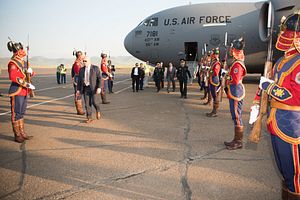With one hand resting on the mane of a sturdy Mongolian horse, U.S. Defense Secretary Mark Esper invoked the name of one of America’s great soldiers as he sought to strengthen the military bonds between the United States and this landlocked democracy sandwiched between Russia and China.
“I’d like to name this fine-looking horse Marshall, after General George Marshall,” Esper said Thursday as he was presented with a 7-year-old buckskin during a time-honored traditional ceremony at Mongolia’s Ministry of Defense.
Esper’s stop in Ulaanbaatar, the third U.S. engagement with Mongolia in recent weeks, underscored its key role in America’s new defense strategy that lists China and Russia as priority competitors.
With just over 3 million people spread over an area twice the size of Texas, Mongolia has worked to maintain its independence from Beijing and Moscow by increasing its ties to other world powers, including the United States. Ulaanbaatar describes the U.S., among other partners, as a “third neighbor.”
Esper has made it clear throughout his weeklong travel across the Asia Pacific that countering China’s aggressive and destabilizing activities in the region is a top administration priority. Those activities, he said, include Beijing’s militarization of manmade islands in the South China Sea, efforts to use predatory economics and debt for sovereignty deals, and a campaign to promote the state-sponsored theft of other nations’ intellectual property.
“We’ve got to be conscious of the toeholds that they’re trying to get into many of these countries,” Esper told reporters traveling with him to Australia, New Zealand, Japan, South Korea, and Mongolia this week.
Esper, who was sworn in as defense secretary in July, said the United States is working to build relationships with key countries in the Indo-Pacific that share values and respect for each other’s sovereignty, “whether it’s Mongolia this trip, Vietnam, a future trip, Indonesia, other countries who I think are key.”
His stop in Mongolia was less than 24 hours long, but he told his defense counterpart, Nyamaagiin Enkhbold, that it gives him the “opportunity to look at different ways we can further strengthen the ties” between the two nations.
As he stood outside the ministry, just steps away from a large statue of Mongolia’s famed founder Genghis Khan, Esper recounted a story of Marshall disciplining one of his soldiers who had struck a Mongolian horse that was being stubborn. Marshall, said Esper, had a high regard for the horses.
As he spoke, the newly named Marshall yawned and stood patiently as Esper patted his neck.
“He’s happy,” Esper said. “He likes his name.”
Esper also presented the horse’s caretaker with a saddle blanket emblazoned with the name and insignia of the U.S. Army’s Old Guard.
The horses, which are bred for endurance, always remain in Mongolia, and the tradition dictates that recipients name them after something they consider important.
Just last week, the Mongolian government gave one of the horses to President Donald Trump’s 13-year-old son, Barron, who named it Victory.
A previous Pentagon chief, Chuck Hagel, got a Mongolian horse when he visited in 2014, and then-Defense Secretary Donald Rumsfeld received one when he went in 2005. Hagel named his 9-year-old buckskin gelding Shamrock, after his high school mascot, and Rumsfeld named his Montana, because the arid, mountainous landscape around the Mongolian capital reminded him of that state.
Esper’s trip is the first by a Pentagon chief since Hagel, and it comes on the heels of a visit to the White House last week by Mongolia’s president, Battulga Khaltmaa, the first since 2011. In addition, national security adviser John Bolton went to Mongolia in June.
Esper said he had no specific goals for the visit involving how the Pentagon can expand its military cooperation with Mongolia. Instead, he said he wants to build stronger relationships at senior defense levels.
The State Department’s 2019 budget for foreign operations was explicit in outlining Mongolia’s importance, stating that the primary goals of U.S. assistance are to “ensure the United States remains a preferred partner over geographical neighbors Russia and China.”
And while U.S. officials have insisted that America is not asking nations to choose between the United States and China, Esper said, “We’ve got to be able to compete with them.”
One senior U.S. official said the United States seeks to expand its defense and intelligence cooperation with Mongolia, noting that its location makes it ideal for listening posts and monitoring stations for peering into both U.S. adversaries. The official was not authorized to discuss details publicly and spoke on the condition of anonymity.
Throughout the wars in Iraq and Afghanistan, Mongolian troops have consistently been a visible force, often providing security at U.S. facilities. The nation still has more than 200 troops in Afghanistan.
In addition, U.S. troops frequently conduct cold-weather training in Mongolia. And in June, U.S. and Mongolian forces participated in the annual Khaan Quest military exercise focusing on peacekeeping and other interoperability training.
More broadly, Mongolia wants to enhance its trade with the United States, and that was a key topic when Battulga met with Trump last week. The country is looking to diversify its trade flows since China buys more than 85 percent of Mongolia’s exports.
The United States is interested in Mongolia’s economic resources, including rare earth metals and cashmere. Most of Mongolia’s raw cashmere is finished in China, triggering interest in finding another market to bolster competition.
The U.S. is open to helping Mongolia expand its access to the trans-Siberian pipeline, thereby allowing a route for shipping goods to the West other than through China.
By Lolita C. Baldor for The Associated Press. Associated Press writer Zeke Miller in Washington contributed to this report.

































